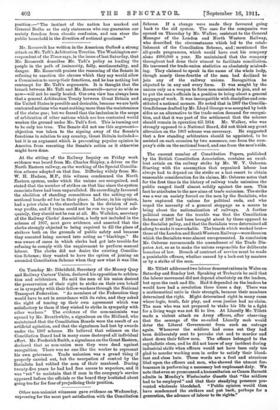The current number of Constitution Papers, published by the British
Constitution Association, contains an excel- lent article on the railway strike by Mr. W. V. Osborne. Starting with the assumption that organized labour has always had to depend on the strike as a last resort to obtain reasonable consideration for its claims, Mr. Osborne notes that for the first time in the history of railway trade unionism the public ranged itself almost solidly against the men. This fact he attributes to the new aims of trade unionism. The strike was a war on society forced on the men by the Socialists, who have captured the unions for political ends, and who urged the necessity of a general stoppage as a means to
bring about the nationalization of railways. A further political reason for the trouble was that the Conciliation Scheme of 1907 had been brought about by those opposed to the Socialist policy, and that the Socialists were determined all along to make it unworkable. The boards which worked best— those of the London and SouthWestern Railway—were those on which the Socialists were almost unrepresented. In conclusion Mr. Osborne recommends the amendment of the Trade Dis- putes Act, so as to make the unions responsible for deliberate breaches of law. Breach of contract of service must be made a punishable offence, whether caused by a lock-out by masters or by a strike of the men.










































 Previous page
Previous page